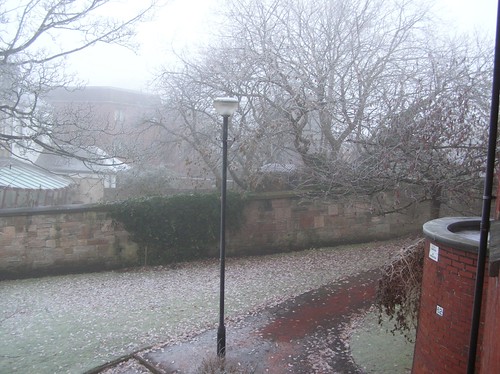There’s something serious I’ve been thinking about this week, though I’ve put off writing anything here. Before I say anything further, it’s important that I emphasise that I don’t want either to co-opt Aaron’s death to my purposes, nor to diminish his life and death to an object lesson. My friends who knew and loved Aaron are still staggering from their loss, and from their awareness of our loss — because as David says, Aaron was a builder.
(If you read my blog, and yet haven’t been following the temblor of grief and shock and anger following Aaron Swartz’s prosecution and death, David’s links will start you. If you’re inclined to take the criminal charges against him quite seriously and wonder why such a fuss about an alleged serial felon whom the Secret Service, and the FBI, and the US Attorney’s offices were all investigating, shore up your initial dubiety by reading Orin Kerr’s guarded affirmation of the charges (1, 2) and then read what Larry Lessig (1, 2) and especially Jamie Boyle had to say.)
In the aftermath of Aaron’s funeral and two memorial services, and in conversation with Jay and Will and Rachel, I wonder why I haven’t heard any theological, ecclesiastical, synagogal leaders speaking about Aaron’s struggle against injustice, and the overwhelming stress that seems to have eclipsed his determination. (Hereafter I’ll speak only as a Christian theologian with a technological turn of mind — if my query touches other traditions, that’s incidental to my main interest.)
At a time when there’s a virtual arms race of church leaders trying to redefine their theology and ecclesiology better to fit a series of demographic shifts and cultural transformations, why have I not heard any of the soi-disant pioneers call attention to the tremendous loss to the internet’s future, to the beneficiaries of digital innovation, to the ‘public’ of the public domain? Why have they not soberly and humbly taken up the question of where the churches stand relative to the enclosure of common goods by indefinitely-extended copyright periods? Why have they not, at the very least, reminded their blogging, Facebooking, tweeting, tumbling, pinboarding, SMSing, iPod-listening audience that Aaron was agitating on behalf of the very digital affordances that have made their movements possible?
There was a big Emergent Christianity conference the weekend Aaron died; did any of the speakers mention him (please tell me ‘yes’). There’s been one Sunday already, and today will be another, in which sermons will be preached around a world increasingly closely woven together through protocols and technologies to which Aaron contributed, on which he worked, for which he stood up; has anyone even heard a prayer of intercession on Aaron’s behalf?
The theological ramifications of technology are only just beginning to receive searching theological attention. My colleagues Jana Bennett and Brian Brock have written books about it, Alan Jacobs has been at it for a long time, and I pitched in my essay; but when a force of digital nature (as it were) falls silent, stills, stops, one might anticipate at least a murmur of theological deliberation about what’s at stake, how we cane to this pass, how churches might take a deep breath and rethink their relation to copyright and the commons, to digital technology and the increasing centralisation of digital power (exemplified by the intensification of government authority to examine, collect, and redeploy all manner of digital data from emails to browser histories, without a warrant). Without for a moment minimising other concerns about other dimensions of human well-being — does not this concern touch the lives of far more people than are even inchoately aware of it, who are at risk of being made an example by a zealous investigator or a self-righteous media corporation?
Some of these have been themes of mine for a long time; Jamie Boyle and I met when he introduced a talk I gave five years ago, arguing that the churches should be at the forefront of challenging copyright extension and embracing (free) digital publishing and distribution; Larry Lessig and I met through my initiative to crowd-source an audio version of his book Free Culture nine years ago.. So, sorry if what I say is repetitious and predictable.
But the churches have an intrinsic interest in communication, free communication, profligate communication. That interest is not simply limited to ‘evangelism’, since our faith that all knowledge of the truth is theologically important warrants an unwavering, unflinching commitment to encourage practices of critical deliberation and exploratory reasoning (even when that exploration leads where we would not ourselves go). Few thigns could be more important to the churches than full capacity to communicate online. Heck, denominations and religious cranks used to (and still do) buy and build and maintain television broadcast networks and radio networks, and print publication plants. How can we not be deeply invested in the well-being, the sturdiness of a communication medium ideally suited to the purposes of a non-profit educational communication endeavour such as ours?
And the churches have an essential theological commitment to justice, justice not just for the privileged stockholders and financiers but for the people whose only access to the prerogatives of wealth comes through generosity, sharing, and openness — libraries, clinics, parks, public (and, once upon a time ‘church’) schooling, shelters, soup kitchens, and so on. The churches’ stand on digital freedom owes a preferential option to those with least resources and least access. The enclosure of vast amounts of human knowledge and imagination in dusty reserves, guarded so as to protect that last trickle of royalties to bloated corporations contravenes the ethics of the Torah and the prophets, the teaching of Jesus and Paul.
And the churches have a fundamental commitment to humanness, to compassion. The churches, above all communities, should care when human souls are threatened, overshadowed, brought to the breaking point of desperation — especially when those who threaten, overshadow, and break such souls do so behind the façade of justice. If we continue to serve Jesus’ promise of the fulness of life, or life abundant, of a grace that sustains and nurtures the greatness of human capacities, then the churches have an obligation to stand up and call to account any force that crushes what is most extraordinary, most promising, most ardent in striving for mutual well-being. The premise that runs through the Scriptures proclaimed in synagogue and church day after day holds that God shows no impartiality, and that God in particular does not take the side of wealth, power, impersonal government processes, no matter how pious their professed intention.
If you can read this, and if you have the very least awareness of what Aaron was up to, I hope that you too are wondering why the churches are silent. I hope that perhaps this was just a respectful interval of restraint, allowing a beautiful life of integrity and brilliance and sorrow to hold centre stage for a while — and that soon we hear the churches speaking out thunderously on behalf of the commons, of justice, of human well-being rather than corporate profits. I hope the churches remember Aaron as someone who taught, in so many ways, the kind of example that the churches should be supporting and living up to.


